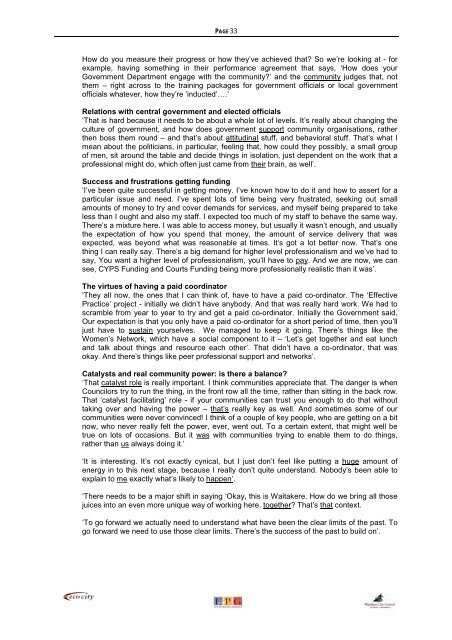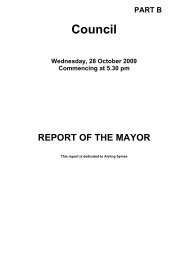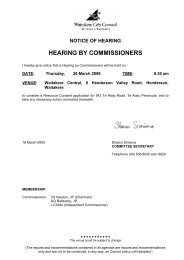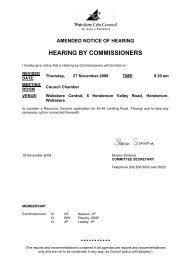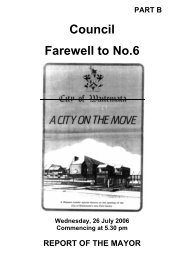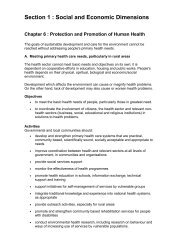The Waitakere Way - Looking Back, Going Forward - Auckland Council
The Waitakere Way - Looking Back, Going Forward - Auckland Council
The Waitakere Way - Looking Back, Going Forward - Auckland Council
Create successful ePaper yourself
Turn your PDF publications into a flip-book with our unique Google optimized e-Paper software.
PAGE 33How do you measure their progress or how they’ve achieved that? So we’re looking at - forexample, having something in their performance agreement that says, ‘How does yourGovernment Department engage with the community?’ and the community judges that, notthem – right across to the training packages for government officials or local governmentofficials whatever, how they’re ‘inducted’….’Relations with central government and elected officials‘That is hard because it needs to be about a whole lot of levels. It’s really about changing theculture of government, and how does government support community organisations, ratherthen boss them round – and that’s about attitudinal stuff, and behavioral stuff. That’s what Imean about the politicians, in particular, feeling that, how could they possibly, a small groupof men, sit around the table and decide things in isolation, just dependent on the work that aprofessional might do, which often just came from their brain, as well’.Success and frustrations getting funding‘I’ve been quite successful in getting money. I’ve known how to do it and how to assert for aparticular issue and need. I’ve spent lots of time being very frustrated, seeking out smallamounts of money to try and cover demands for services, and myself being prepared to takeless than I ought and also my staff. I expected too much of my staff to behave the same way.<strong>The</strong>re’s a mixture here. I was able to access money, but usually it wasn’t enough, and usuallythe expectation of how you spend that money, the amount of service delivery that wasexpected, was beyond what was reasonable at times. It’s got a lot better now. That’s onething I can really say. <strong>The</strong>re’s a big demand for higher level professionalism and we’ve had tosay, You want a higher level of professionalism, you’ll have to pay. And we are now, we cansee, CYPS Funding and Courts Funding being more professionally realistic than it was’.<strong>The</strong> virtues of having a paid coordinator‘<strong>The</strong>y all now, the ones that I can think of, have to have a paid co-ordinator. <strong>The</strong> ‘EffectivePractice’ project - initially we didn’t have anybody. And that was really hard work. We had toscramble from year to year to try and get a paid co-ordinator. Initially the Government said,Our expectation is that you only have a paid co-ordinator for a short period of time, then you’lljust have to sustain yourselves. We managed to keep it going. <strong>The</strong>re’s things like theWomen’s Network, which have a social component to it – ‘Let’s get together and eat lunchand talk about things and resource each other’. That didn’t have a co-ordinator, that wasokay. And there’s things like peer professional support and networks’.Catalysts and real community power: is there a balance?‘That catalyst role is really important. I think communities appreciate that. <strong>The</strong> danger is when<strong>Council</strong>ors try to run the thing, in the front row all the time, rather than sitting in the back row.That ‘catalyst facilitating’ role - if your communities can trust you enough to do that withouttaking over and having the power – that’s really key as well. And sometimes some of ourcommunities were never convinced! I think of a couple of key people, who are getting on a bitnow, who never really felt the power, ever, went out. To a certain extent, that might well betrue on lots of occasions. But it was with communities trying to enable them to do things,rather than us always doing it.’‘It is interesting. It’s not exactly cynical, but I just don’t feel like putting a huge amount ofenergy in to this next stage, because I really don’t quite understand. Nobody’s been able toexplain to me exactly what’s likely to happen’.‘<strong>The</strong>re needs to be a major shift in saying ‘Okay, this is <strong>Waitakere</strong>. How do we bring all thosejuices into an even more unique way of working here, together? That’s that context.‘To go forward we actually need to understand what have been the clear limits of the past. Togo forward we need to use those clear limits. <strong>The</strong>re’s the success of the past to build on’.


